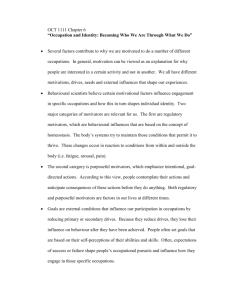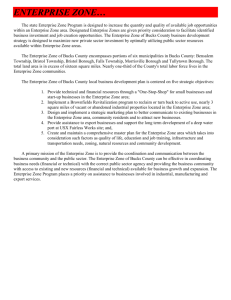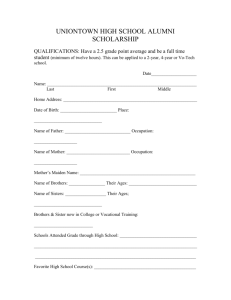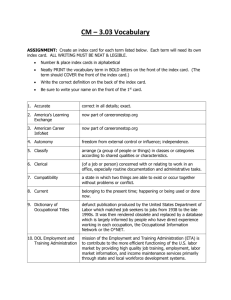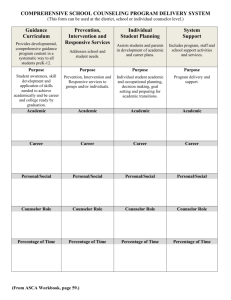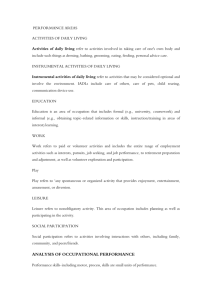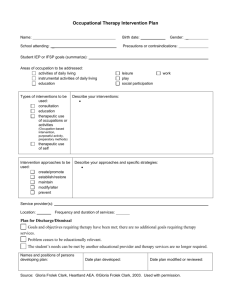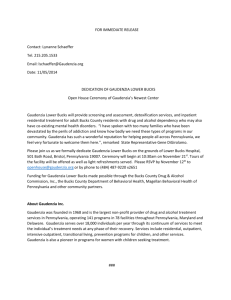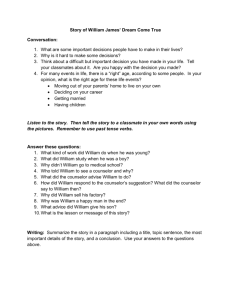Undecided Major Workbook - Bucks County Community College
advertisement
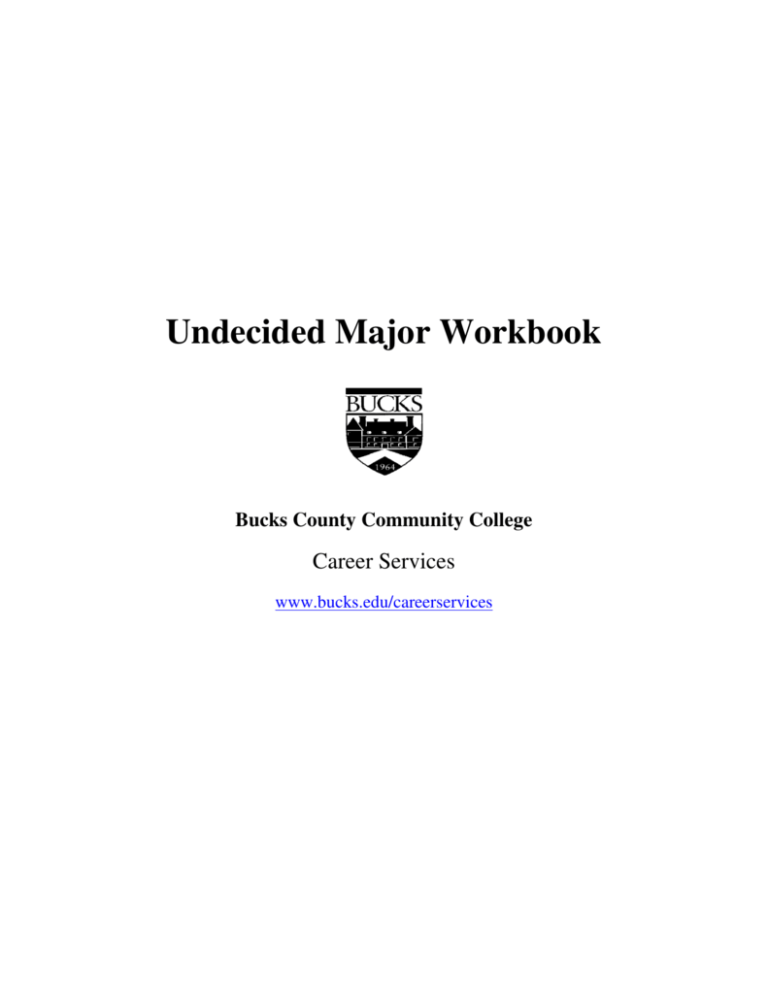
Undecided Major Workbook Bucks County Community College Career Services www.bucks.edu/careerservices Table of Contents Introduction .................................................................................................................................................. 3 Overview of The Career Planning Process ................................................................................................... 4 Part I: Self Assessment ................................................................................................................................. 5 Self Assessment Exercises ........................................................................................................................ 6 Self Assessment: Interests .................................................................................................................... 6 Self Assessment: Skills......................................................................................................................... 15 Composite Profile:............................................................................................................................... 20 Self Assessment:Values ....................................................................................................................... 21 Part II: RESEARCHING OCCUPATIONS ......................................................................................................... 24 Occupational Research Resources ......................................................................................................... 24 Exercise 1. Beginning Occupational Research.................................................................................... 25 Exercise 2. Further Occupational Research ....................................................................................... 28 Exercise 3. Advanced Occupational Research; Conducting An Information Interview ..................... 29 Part III: Making Decisions & Taking Action ................................................................................................. 32 Exercise 1. Making Your Decision ........................................................................................................... 32 Exercise 2. Creating An Action Plan ........................................................................................................ 34 2 Introduction If you have not yet decided on a major or you are changing your mind about your major or career goals, you will be welcomed and supported at Bucks County Community College. In fact, we invite you to use your time here to explore your options and carefully develop a clear vision for your future. You may have many interests and need help narrowing it down. You may not yet have found any particular subject or field that interests you. You may need more information about a particular field. Or you may just want to explore all the College has to offer before you choose a major. You are not alone. In recent years a large percent of new college students start as undeclared majors and many change their majors more than once before earning a degree. Since we spend a large part of our lives working, career planning is life planning. Your career decisions affect your lifestyle, your health and your overall sense of satisfaction and happiness. Therefore it is important to make informed choices regarding your academic and career goals. However, it’s equally important to note that the average American worker will change careers four or more times over the course of their lives. So, you will likely have time to develop your interests, expand your options and change your mind over the course of your career. Using this Workbook and other BCCC will provide you with more information about yourself, more information about careers, and more information about the options available to you. Work through this Workbook with a Student Planning Counselor. Call Student Services at 215968-8182 or Career Services Center at 215-968-8195 to arrange an appointment. Or, consider attending a career exploration workshop. For specific dates and times go to http://www.bucks.edu/careerservices/Upcoming_events.html. Set a goal for when you would like to have made a decision about your major and/or career goal. Then, set some realistic deadlines for completing each exercise in this Workbook. Best wishes for a rewarding academic and career journey! 3 Overview of The Career Planning Process First, let’s get an overview of the career planning process. All of the following steps should be done with the assistance of a Student Planning Counselor. 1. Self assessment The first step in making good career decisions is self assessment, or simply learning more about you. This includes speaking with a Student Planning Counselor and taking career assessments both online and in person. This book contains four self assessment exercises. 2. Occupational Research Gather information on specific academic majors and career fields to determine which options match your self assessment result from the previous step. This step is vital to ensure, not only a good fit but also that you have a realistic picture of the opportunities and challenges that are available to you. This book contains 3 occupational research exercises. 2. Making Decisions Using the “DECIDES” model in this book will help you to make your decision regarding your career and academic goals. Do this exercise with the assistance of a Counselor or trusted friend. 3. Goal Setting and Taking Action This step is the one that will help you to make your vision a reality. You will learn to make decisions, set goals, and develop an action plan. It is important to periodically evaluate your progress and review and update your plan. 4. Review the decision and make adjustments Finally, while you are going through this process you will undoubtedly learn more about your chosen major and field. Some of this learning will take place through trial and error. We suggest that you periodically review where you are in relation to your goal and how much you are enjoying each step. This process will assist you in knowing when to make adjustments, change your mind, or gather more information. Do what you need to keep going in the right direction for you. 4 Part I: Self Assessment Self Assessment Resources For You Since the first step in career planning and decision making is self assessment, we would like to introduce you to some of the self assessment career tools that we use at the college. We offer the following self assessment tools in order to identify your strongest interests, skills, values and personality preference that can help you to find occupations that are a good fit. It’s important that you use more than one type of assessment tool to identify careers and majors that might suit you. Work with your Counselor to identify which of the following resources might be best for you. Assessment Name Where You can Find It Personality Mosaic In this book on page Basic Skills Assessment In this book on page 15 Values Sentence Completion In this book on page 21 Career Cruising www.careercruising.com Strong Interest Inventory See your counselor to take this online Meyers Briggs Type Indicator See your counselor to take this in the Career Center Bucks Online Career Quiz www.bucks.edu/careerservices-wheel/code-quiz. 6 * Contact a Counselor by calling 215-968-8195, 215-968-8182 or at career@bucks.edu 5 Self Assessment Exercises Self Assessment: Interests Exercise 1. PERSONALITY MOSAIC Circle ONLY the numbers that clearly feel like something you might say or think. Don’t spend too much time on any one item. Just circle the first things that come to mind. 1. It's important for me to have a strong, agile body. 2. I need to understand things thoroughly. 3. Music, color, beauty of any kind can really affect my moods. 4. People enrich my life and give it meaning. 5. I have confidence in myself that I can make things happen. 6. I appreciate clear directions so I know exactly what to do. 7. I can usually carry/build/fix things myself. 8. I can get absorbed for hours in thinking something out. 9. I appreciate beautiful surroundings; color and design mean a lot to me. 10. I love company. 11. I enjoy competing. 12. I need to get my surroundings in order before I start a project. 13. I enjoy making things with my hands. 14. It's satisfying to explore new ideas. 15. I always seem to be looking for new ways to express my creativity. 16. I value being able to share personal concerns with people. 17. Being a key person in a group is very satisfying to me. 18. I take pride in being very careful about all the details of my work. 19. I don't mind getting my hands dirty. 6 20. I see education as a lifelong process of developing and sharpening my mind. 21. I love to dress in unusual ways, to try new colors and styles. 22. I can often sense when a person needs to talk to someone. 23. I enjoy getting people organized and on the move. 24. A good routine helps me get the job done. 25. I like to buy sensible things I can make or work on myself. 26. Sometimes I can sit for long periods of time, work on puzzles, read or just think about life. 27. I have a great imagination. 28. It makes me feel good to take care of people. 29. I like to have people rely on me to get the job done. 30. I'm satisfied knowing that I've done an assignment carefully and completely. 31. I'd rather be on my own doing practical, hands-on activities. 32. I'm eager to read about any subject that arouses my curiosity. 33. I love to try creative new ideas. 34. If I have a problem with someone, I prefer to talk it out and resolve it. 35. To be successful, it's important to aim high. 36. I prefer being in a position where I don't have to take responsibility for decisions. 37. I don't enjoy spending a lot of time discussing things... What's right is right. 38. I need to analyze a problem pretty thoroughly before I act on it. 39. I like to rearrange my surroundings to make them unique and different. 40. When I feel down, I find a friend to talk to. 41. After I suggest a plan, I prefer to let others take care of the details. 42. I'm usually content where I am. 43. It's invigorating to do things outdoors. 44. I keep asking "why''. 45. I like my work to be an expression of my moods and feelings. 7 46. I like to find ways to help people care more for each other. 47. It's exciting to take part in important decisions. 48. I'm always glad to have someone else take charge. 49. I like my surroundings to be plain and practical. 50. I need to stay with a problem until I figure out an answer. 51. The beauty of nature touches something deep inside me. 52. Close relationships are important to me. 53. Promotion and advancement are important to me. 54. Efficiency, for me, means doing a set amount carefully each day. 55. I'm not afraid of heavy work and usually know what needs to be done. 56. Thought-provoking books always broaden my perspective. 57. I look forward to seeing art show, plays, and good times. 58. I haven't seen you for so long; I'd love to know how you're doing. 59. It's exciting to influence people. 60. When I say I'll do it, I follow through on every detail. 61. Good, hard physical work never hurt anyone. 62. I'd like to learn all there is to know about subjects that interest me. 63. I don't want to be like everyone else; I like to do things differently. 64. Tell me how I can help you. 65. I'm willing to take some risks to get ahead. 66. I like exact directions and clear rules when I start something new. 67. The first thing I look for in a car is a well-built engine. 68. Those people are intellectually stimulating. 69. When I'm creating, I tend to let everything else go. 70. I feel concerned that so many people in our society need help. 71. It's fun to get ideas across to people. 8 72. I hate it when they keep changing the system just when I get it down. 73. I usually know how to take care of things in an emergency. 74. Just reading about those new discoveries is exciting. 75. I like to create happenings. 76. I often go out of my way to pay attention to people who seem lonely and friendless. 77. I love to bargain. 78. I don't like to do things unless I'm sure they're approved. 79. Sports are important in building strong bodies. 80. I've always been curious about the way nature works. 81. It’s fun to be in a mood to try or do something unusual. 82. I believe that people are basically good. 83. If I don't make it the first time, I usually bounce back with energy and enthusiasm. 84. I appreciate knowing exactly what people expect of me. 85. I like to take things apart to see if I can fix them. 86. Don't get excited. We can think it out and plan the right move logically. 87. It would be hard to imagine my life without beauty around me. 88. People often seem to tell me their problems. 89. I can usually connect with people who get me in touch with a network of resources. 90. I don't need much to be happy. Proceed to the next page in order to score this exercise. 9 SCORING YOUR ANSWERS for Exercise 1. PERSONALITY MOSAIC To score, circle the same numbers below that you circled on the Personality Mosaic. R I A S E C 1 2 3 4 5 6 7 8 9 10 11 12 13 14 15 16 17 18 19 20 21 22 23 24 25 26 27 28 29 30 31 32 33 34 35 36 37 38 39 40 41 42 43 44 45 46 47 48 49 50 51 52 53 54 55 56 57 58 59 60 61 62 63 64 65 66 67 68 69 70 71 72 73 74 75 76 77 78 79 80 81 82 83 84 85 86 87 88 89 90 Now add up the number of circles in each column: R __________ I __________ A __________ S__________ E __________ C__________ Which are your three highest letters R, I, A, S, E, C? 1st __________ 10 2nd __________ 3rd __________ INTERPRETING THE RESULTS Look over the following description of the six components of the Personality Mosaic and see which one fits you best. Does this description agree with your scores? 1. REALISTIC (R) o Independent/practical/physically strong/often aggressive/conservative. Uses hands/eyes to explore things, achieve o Uses body skillfully, rather than words, thoughts, or feelings o Requires physical coordination, strength, agility, logic o Enjoys risk, excitement, being outdoors, concrete problems, money, using tools, large machinery o Solves problems by doing 2. INVESTIGATIVE (I) o Independent /curious/intellectual/introspective/unconventional uses reading/instruments to explore ideas o Uses mind/information to achieve, rather than association with people and things o Requires mental ability, logic, insight o Enjoys challenge, variety, and complicated, abstract problems. Solves problems by thinking 3. ARTISTIC (A) o Creative/sensitive/aesthetic/independent/introspective/expressive/ unsocial o Uses hands/eyes/mind to create new things, writings ways of doing things o Requires good eyes, ears, intelligence, perception of color, form, sound, and feelings o Enjoys beauty, unstructured activity, variety, interesting and unusual sights, sounds, textures, people o Solves problems by creating 4. SOCIAL (S) 11 o Concerned leader/sensitive/humanistic/supportive/responsible o Uses feelings, words, and ideas to work with people, rather than physical activity or things o Requires empathy, fact, perceptiveness, insight, genuineness o Enjoys closeness, sharing, groups, unstructured activity, being in charge o Solves problems by feeling 5. ENTERPRISING (E) o Energetic/independent/enthusiastic/confident/dominant/political o Uses mind, words, feelings, to deal with people and achieve requires sensitivity, insight, assertion, verbal ability, and logic 6. o Enjoys organizing, persuading, leading, managing, excitement, variety, status, power, money o Solves problems by risking CONVENTIONAL (C) o Placid/orderly/careful/accurate o Uses mind, eyes, hands to carry out tasks o Requires logic, care, responsibility o Enjoys order, certainty, security, identifying with power, status o Solves problems by following rules Now that you know you have recorded your Personality Mosaic, and have begun to identify your interests, you are more prepared to take our online career quiz to look for Bucks majors that would be a good fit for you. The following exercise will help. 12 Exercise 2. BUCKS ONLINE CAREER QUIZ Bucks Career Quiz; The Bucks Online Career Quiz will link your interests directly to Bucks majors. From the quiz you explore information about each major that might suit you, including course descriptions from our Catalog. First, take the quiz by going to www.bucks.edu/careerservices/c-wheel/code-quiz.html. 1. Using your results from the Personality Mosaic exercise above and the online career quiz, circle your top three clusters from the following list: Realistic Investigative Artistic Social Enterprising Conventional Using the website links from the career quiz, answer the following questions. 2. What are three majors from your top three career clusters that sound interesting to you? And what academic department does each of your top three choices belong to? Name and Number of the Major Name of the Academic Department __________________________________ __________________________________ __________________________________ __________________________________ __________________________________ __________________________________ 3. Now, summarize the description of each of the three majors you listed above. Hint--What does each of the three majors prepare students to do? Is it an “Occupational or Transfer” Major? a. Description for choice #1 ___________________________________________________________________________ ___________________________________________________________________________ __________________________________________________________________________ b. Description for choice #2 ___________________________________________________________________________ ___________________________________________________________________________ __________________________________________________________________________ 13 c. Description for choice #3 ___________________________________________________________________________ ___________________________________________________________________________ ___________________________________________________________________________ 4. What are some Occupations that match your choices from R, I, A, S, E, C from the Personality Mosaic and from the Online Career Quiz? ______________________________________________________________________________ ______________________________________________________________________________ 5. What is the difference between an Occupational Major and a Transfer Major at Bucks? ______________________________________________________________________________ _____________________________________________________________________________ 6. Will you consider pursuing a career that requires more than an Associates degree? Yes No 7. If so, what level of education are you willing to pursue? Associates Degree Bachelors Degree Masters Degree Doctoral Degree 8. Will you be attending school full time or part time? ____________________________ 9. Approximately how long will it take you to earn the highest level of education you are interested in pursuing? __________________________________________________ It is perfectly fine for you to not know what level of education you are willing to pursue at this time. However, it’s important that you periodically review this decision as you progress through your academic life. We hope that the exercises in this Workbook will help you to clarify this decision. This is also a great topic for discussion with your counselor, family and trusted friends. Now, let’s identify your skills. Proceed to the next exercise # 3. 14 Self Assessment: Skills Exercise 3: BASIC SKILLS ASSESSMENT FOR YOU This skills inventory allows you to evaluate your strengths and weaknesses in a variety of activities. Knowing your skills will help you to set realistic academic and career goals. Rank your skills in the chart below. Make sure that you only put your ranking numbers for each item in the shaded box. Write "3" in the shaded box next to an activity if you have a definite or strong skill in that area…3 Write "2" in the shaded box if you have a moderate degree of skill in that activity…2 Write "1" in the shaded box to indicate that you have enough skill to get by with some help…1 Write "0" in the shaded box if you believe you have no skill at all in that particular activity…0 1 1. 6. Operating office machines such as copiers, typewriters, computers, etc. Painting, varnishing, or staining wood or metal surfaces. Sketching, drawing, or painting; carving or sculpting objects. Mixing chemicals according to scientific formula. Organizing campaigns for candidates in clubs or other groups. Performing in athletic competitions. 7. Planning social events or activities. 8. Entertaining others. 9. Planning a personal budget. 2. 3. 4. 5. 10. 11. 12. 2 3 4 5 6 Experimenting with and creating new recipes. Developing original ideas for new gadgets. Working with wood using power tools, hand tools & other equipment. Page One totals: add numbers in each 15 1 13. Getting along with others who are different from you. 14. Naming basic foods and telling why they are nutritious. 15. Reading data tables, graphs and charts. 16. Setting up a scientific demonstration for a class or science fair. 17. Leading others in different activities. 18. Teaching or tutoring others. 19. 20. Moving into new situations with ease and comfort. Interpreting changes in the economy. 21. Persuading others to follow a new idea. 22. Explaining new ideas to others. 23. Working outdoors for long periods of time. 24. Doing interpretive readings of stories, poetry or verse. 25. Organizing or filing materials (records, stamps, photos,.etc.) 26. Performing effectively in debates. 27. Understanding recent newspaper articles on scientific breakthroughs. 28. Describing the different classification systems: for plants and animals. 29. Impersonating the speech and mannerisms of others. 30. Reading topographical or navigational maps. 31. Putting together toys, furniture, or machinery that comes unassembled. 32. Keeping financial records. 33. Typing, operating a calculator or other business machine. 34. Managing or supervising others in a work group. 35. Keeping an accurate checkbook. Page Two Totals 16 2 3 4 5 6 1 2 3 4 5 6 36. Selling products. 37. Using a color wheel to mix colors or create color complements. 38. Naming the different cloud formations. 39. Organizing ideas or numbers so that they are clear and understandable. 40. Repairing furniture or other wood, glass or ceramic objects. 41. Proofreading papers or records and finding mistakes. 42. Writing essays, stories or poetry. 43. Designing and making your own clothes. , 44. Spelling and using punctuation and grammar correctly. 45. Cleaning, adjusting or repairing bicycles, motors or machines,. 46. Keeping accurate records. 47. Completing tasks that require physical endurance and agility. 48. Using a microscope. 49. Singing or acting. 50. Using a computer to make mathematical calculations. 51. Supervising children's activities. 52. Arranging color harmonies and furnishings in a home. 53. Making clothes or wearing apparel from patterns. 54. Driving a tractor or a truck. 55. Meeting new people. 56. Examining or keeping budgets for businesses. 57. Interviewing others to get information about attitudes, feelings and beliefs. 58. Acting as a spokesperson for a group. Page Three Totals 17 1 59. Organizing your time to accomplish tasks. 60. Accepting and giving criticism. 61. Helping others find resolutions for their disputes. 62. Working in an office environment and doing a good job. 63. Helping others feel comfortable in new situations. 64. Encouraging and supporting others. 65. Reading blueprints and diagrams. 66. 67. Understanding how the legal system operates and how laws are passed. Learning foreign languages. 68. Playing a musical instrument. 69. Finding and capitalizing on bargains and sales. 70. Working with others in a team effort. 71. 78. Acting as a secretary or treasurer in a club or organization. Soliciting contributions to charities or political organizations. Doing odd jobs with a saw, hammer and nails, screwdriver and plane. Following the story line and message in movies, plays and books. Making drawings with a compass, triangle, ruler & other instruments. Solving puzzles or figuring out how things work. Assessing others' needs & helping them find solutions to their problems. Giving speeches before a large group. 79. Performing ballet, tap dance or gymnastics. 80. Identifying the major constellations of the stars. 81. Installing or repairing household electrical circuits. 72. 73. 74. 75. 76. 77. Page Four Totals 18 2 3 4 5 6 1 2 3 4 5 6 82. Planting and/or cultivating vegetable, flower or rock gardens. 83. Telling stories or jokes. 84. Understanding other people's personalities. Page Five Totals Go back and carefully add the numbers in each column on each page and record the totals in the spaces provided. Then re-record the page totals in the chart below. Last, add the scores in each column to determine your Grand Totals. 1 2 3 4 5 6 Page One Totals Page Two Totals Page Three Totals Page Four Totals Page Five Totals Skills Grand Totals R 1 A S E C Proceed to exercise 4 to find out how to use your skills assessment results. 19 Exercise 4. SUMMARY PROFILE FOR YOU The final step is to pull together a composite picture of your interests and your skills. Doing so will allow you to look at your interests and skills separately and then to compare the consistency of interest and skill areas with each other. 1. First, write your top three interests corresponding letters from Exercise 1. Personality Mosaic below next to the word Interests below. 2. Then write your top three skills from Exercise 3. next to the word Skills below. 3. Then combine the results to get a composite of both Interests and Skills. Last, write the LETTERS (R, I, A, S, E, C) that correspond to your highest scores. Interests __________ __________ __________ Skills __________ __________ __________ __________ __________ __________ Composite Profile: Remember, you can always go back to the Bucks online Career quiz wheel at www.bucks.edu/careerservices/c-wheel/code-quiz.html to look at majors that match your composite profile. Which Majors appeal to you most? Those which fall under Realistic, Investigative, Artistic, Social, Enterprising, or Conventional? Now that you are getting clearer about how your interests and skills can help you identify majors and careers, complete the next exercise in order to begin identifying your strongest values; those things which are most important to you in life. Proceed to the next exercise (#5). Please note: Your Counselor will show you where you can find lists of occupations that match your interests and skills by categories; Realistic, Investigative, Artistic, Social & Enterprising. 20 Self Assessment:Values Exercise 5: INCOMPLETE VALUES SENTENCES FOR YOU Complete each of the following sentences: 1 The greatest joy in my life is__________________________________________________ 2. The biggest decision I ever made was__________________________________________ 3. I worry about ____________________________________________________________ 4. As a child I dreamed of _____________________________________________________ 5. The thing I love most about life is_____________________________________________ 6. What I would like to change in my life is________________________________________ 7. The three things in the world I would change are__________________________________ 8. I hope some day to_________________________________________________________ 9. I spend most of my time_____________________________________________________ 10. The greatest sorrow of my life is_____________________________________________ 11. I would prefer to be_______________________________________________________ 12. A friend is someone who___________________________________________________ 13. My favorite kind of person is________________________________________________ 14. Money is ________________________________________________________________ 16. What I would like to do most is______________________________________________ 17. To me, kids are___________________________________________________________ 18. The work I do is__________________________________________________________ 19. The people I work with are__________________________________________________ 20. If I were the boss I would___________________________________________________ 21. When I retire I am_________________________________________________________ 22. My favorite place in the world is_____________________________________________ 23. The person who influenced me the most taught me to ____________________________ 24. I daydream the most about__________________________________________________ 25. The accomplishment I am most proud of is_____________________________________ 26. The quality I would most like to develop is_____________________________________ 21 What are your life values? Rank the following 20 values in the order of their importance to you, 1 being most important and 20 being least. If you feel like you have some values that are not listed here, add them to the list using the blank lines. You may want to use pencil so that you can change things around. ……………….. Family ………………...Prestige …………………Independence …………………Spirituality …………………Meaningful work …………………Helping others …………………Physical health …………………Leisure …………………Financial security …………………Financial wealth …………………Creativity …………………Love …………………Physical beauty …………………Success in my chosen occupation …………………Lifelong Learning …………………Adventure …………………Beautiful Surroundings …………………Honesty …………………Friendships and social involvement …………………Happiness ………………… ……………………………………………….. ………………… ……………………………………………….. ………………… ……………………………………………….. ………………… ……………………………………………….. ………………… ……………………………………………….. Now list your top ten values in order on the lines below 1. …………………………………………………. 2. …………………………………………………. 3. …………………………………………………. 4. …………………………………………………. 5. …………………………………………………. 6. …………………………………………………. 7. …………………………………………………… 8. …………………………………………………… 9. …………………………………………………… 10. …………………………………………………….. 22 Great! Now that you have some ideas about your interests, skills and values, we suggest learning more about your personality preference and occupations. MBTI: Myers-Briggs Type Indicator is a personality assessment that can help you to identify your preferences. By doing so you can find out what occupations people with similar preferences do well in and enjoy. Your Counselor can help you decide if this is a good resource for you. If so, be sure to discuss your results with him/her. If you have chosen to use the MBTI, please complete the following exercise. If not, proceed to Part II, Occupational Research. For an appointment to take the MBTI call 215-968-8195. Exercise 6: Your MBTI Type and You After discussing your MBTI results with a Counselor, please answer the following questions. 1. What is your four letter type, and what is your understanding of what this says about you? ___________________________________________________________________________ ___________________________________________________________________________ ___________________________________________________________________________ 2. What are some conditions under which a person with your preferences will feel most comfortable? ___________________________________________________________________________ ___________________________________________________________________________ ___________________________________________________________________________ 3. What are some suggested occupations for your MBTI from your results handouts? From the book Do What You Are and/or What is Your Type of Career? ___________________________________________________________________________ ___________________________________________________________________________ ___________________________________________________________________________ 4. Are there any occupational themes that are becoming clear to you? For example do your results from the beginning interests, skills, and values exercises have any common patterns with those from your MBTI? Yes No Please explain: ___________________________________________________________________________ ___________________________________________________________________________ ___________________________________________________________________________ 23 Part II: RESEARCHING OCCUPATIONS Occupational Research Resources One of the most important aspects of career decision-making is the process of gathering information about occupations that are of interest to you. Researching occupations can help you discover the realities of choosing a particular career path. The following resources are where you will find the answers to the questions contained in the Occupational Research Exercises in Part II. Occupational Outlook Handbook; This is an online publication created to help students and members of the community find information about jobs and industries. It contains descriptions of about 250 specific positions, including the nature of the work, places of employment, training/educational requirements, salary and job market projections, and sources of additional information about particular careers (e.g., professional organizations and governmental agencies).You can find it at www.bls.gov. Discover; At this point if you have not done so already, it will be important to use Discover, our online career guidance program. You can use the Occupations section of Discover to answer the important questions in the next exercise. You can also use Discover to answer the following important questions; What can I do with a major in…….? and What schools offer the majors that I’m interested in? Ask your Counselor for an access ID to begin using Discover. You can also use Discover to take additional career assessments. Occupational Information Network (O*NET) Online; this is America’s most comprehensive source of on-line information about careers. It contains an up-to-date set of descriptions for almost 1,000 different careers, plus lots of other important career information. You can find it at http://online.onetcenter.org. Note: For the Occupational Research Exercises that follow, you will need to choose an occupation to study. Choose one from your self assessment exercises or simply choose an occupation that you would like to learn more about. Try not to get stuck on this. By choosing a field to research, you are not committing to anything, you are simply learning where and how to find important information that will help you to make a good decision. 24 Exercise 1. Beginning Occupational Research Now that you have identified some possible occupations/majors, choose one that you would like to know more about. Using either the Occupational Handbook or Discover or both please answer the following questions. WHAT IS THE NATURE OF THE WORK IN THIS OCCUPATION? ◊ Why does this occupation exist? What needs does it serve? What is the purpose of this occupation? __________________________________________________________ ____________________________________________________________________ ◊ Major duties and responsibilities, job functions performed ____________________ ___________________________________________________________________ ◊ Products made or services provided by this occupation ____________________________________________________________________ ◊ Specializations within the occupation _____________________________________ ____________________________________________________________________ EDUCATION & TRAINING NEEDED FOR THIS OCCUPATION ◊ What college courses or degrees are required or helpful for preparing a person for this work? _____________________________________________________________________ _____________________________________________________________________ ◊ What previous work experience may be required to enter this occupation? __________ ______________________________________________________________________ ◊ What credentials, licensing, certifications are required for employment? ____________ ______________________________________________________________________ ◊ What is the approximate time-frame and financial cost required to get the necessary training for this work? __________________________________________________________ SKILLS, ABILITIES & PERSONAL CHARACTERISTICS REQUIRED ◊ What personal interests make a person suited for this job? ________________________ _______________________________________________________________________ ◊ Special qualities or temperament a person should have for the occupation (for example, the ability to work well under pressure, take risks, or spend long hours alone) _________________________________ _______________________________________________________________________________________ ◊ What specific requirements are necessary or helpful? (for example, knowledge of a foreign language or specific computer programs) ______________________________________________________________ 25 EARNINGS, SALARY RANGE AND BENEFITS ◊ Beginning, average and top salaries in the field __________________________________ ◊ Benefits typically offered (for example, health insurance, retirement plans, education reimbursement, training) _________________________________________________________________________________ WORKING CONDITIONS IN THE OCCUPATION ◊ Description of the typical environment ________________________________________ ________________________________________________________________________ ◊ Work schedule - hours required, time of day, overtime ___________________________ ________________________________________________________________________ ◊ What type of supervision or management is typically seen in this occupation? _________ ◊ Opportunities for initiative, creativity, independence ______________________________ _________________________________________________________________________ ◊ Dress requirements _________________________________________________________ ◊ Travel requirements _________________________________________________________ TYPES OF EMPLOYERS THAT HIRE PEOPLE IN THIS OCCUPATION ◊ What types of organizations, companies, agencies and industries that employ people in this occupation? ________________________________________________________________ __________________________________________________________________________ ◊ Opportunities for self-employment ______________________________________________ EMPLOYMENT AND ADVANCEMENT OUTLOOK ◊ What are recent and anticipated employment trends for the occupation on national, state and local levels? ______________________________________________________________ _________________________________________________________________________ ◊ What are the opportunities for advancement and average time it takes to be promoted? ____ __________________________________________________________________________ ◊ How much time it takes to become employed in occupation after training and education? __________________________________________________________________________ ◊ How much job security is typically found in this field? ______________________________ __________________________________________________________________________ RELATED OCCUPATIONS ◊ What other occupations are similar to this one that may involve more or less training or have slightly different requirements? _________________________________________________ 26 ___________________________________________________________________________ Now that you have identified your interests, skills, values, personality preferences and some important occupational information, we suggest getting real life information. At this point speak to someone from the academic departments you are considering. Departmental contact information is listed below. For specific contact names go to http://www.bucks.edu/advising/depts.html. Department of the Arts Department of Business Studies Hicks 125 · (215) 968-8425 http://www.bucks.edu/academic/arts/ Penn 401 · (215) 968-8227 http://www.bucks.edu/academic/biz/ Department of Health, Physical Education and Nursing Department of Math, Science and Technology Gym 102 · (215) 968-8451 http://www.bucks.edu/academic/health/ Founders 113A · (215) 968-8305 http://www.bucks.edu/academic/math/ Department of Language and Literature Department of Social and Behavioral Science Penn 101 · (215) 968-8150 http://www.bucks.edu/academic/lang_lit/ Founders 210A · (215) 968-8060 http://www.bucks.edu/academic/social/ Use the space below to take notes about the academic programs offered in your field of interest: 27 Exercise 2. Further Occupational Research Select a career field you would like to learn more about ____________________ For the career field you research, answer the following questions using resources listed previously: 1. What are the names of three directories, trade journals, or websites you have identified that relate to your field of interest? Where are they found? a.______________________________________________________________________ b.______________________________________________________________________ c.______________________________________________________________________ 2. Describe a current trend in your field that is discussed in one of these journals: ________________________________________________________________________ ________________________________________________________________________ ________________________________________________________________________ ________________________________________________________________________ ________________________________________________________________________ 3. List one person on-campus who you may be able to contact to learn more about this field: ________________________________________________________________________ 4. List one person off-campus who you may be able to contact as part of your research: ________________________________________________________________________ 5. Name one print/web resource you will use to learn more about the field: ________________________________________________________________________ 6. Name one organization/club/job/project you could pursue to test out the field ________________________________________________________________________ 28 Exercise 3. Advanced Occupational Research; Conducting An Information Interview One of the best ways to get accurate, real life information about a career is to interview professionals who are actually working in that career, which is know as “informational interviewing.” There are a number of important benefits of informational interviewing and job shadowing. Some of them are: • reality testing an occupation • getting “inside” information about what a career is really like • networking with professionals in the field, and • gaining experience and confidence with interview situations that may help you prepare for future job interviews. Since information interviews can be a source of valuable information about careers and provide possible contacts for future employment opportunities, we recommend the following information interview assignment. 1. Select a career that you may be interested in pursuing. If you are still undecided, pick a career that might be a possibility. You can use your results from the previous exercises to help you identify a career that may be most appealing to you. 2. Find someone who is working in the career you selected and set up an information interview with that person. To help locate possible interview candidates, consider members of your family, friends of your family members’ friends, and family members of your friends as well as faculty and staff at Bucks. If you begin by asking all of these people, chances are someone will be able to help you to identify a person who would be willing to provide you with some good information. Once you have identified a professional in your field of choice, phone or e-mail them, asking them about the possibility of scheduling a short interview. Mention that you would be willing to conduct the interview in person or by phone, whichever would be more convenient for them. If you do not hear back within a reasonable period of time (e.g., within a couple of weeks), send a follow-up message; if you do not receive a response to the follow-up message, then consider contacting someone else. 3. Conduct an informational interview with the professional who has agreed to speak with you. Some helpful suggestions are included on the following page. 29 Suggested Strategies for Conducting Information Interviews o Call in advance to confirm your appointment o Dress professionally for the meeting o Thank the person for taking the time to speak with you. o Take notes during the interview. o Prepare your interview questions in advance. o Here are some questions that you might ask 1. How did you decide on your career? 2. What qualifications or prior experiences did you have that enabled you to enter your career? 3. How does someone learn about job openings in your field? 4. What specific steps did you follow in your career to find your current position? 5. What advice would you give to beginning college students about things they could start doing now to help them prepare to enter your field? 6. During a typical workday, what do you spend most of your time doing? 7. What do you like most about your career? 8. What are the most difficult or frustrating aspects of your career? 9. What personal skills or qualities do you see as being critical for success in your career? 10. How does someone advance in your career? 11. Are there any moral issues or ethical challenges that tend to arise in your career? 13. What impact does your career have on your home life or personal life outside of work? 14. If you had to do it all over again, would you choose the same career? 15. Would you recommend that I speak with anyone else for additional information? 16. If the interview goes well, consider asking if might be possible to “shadow” your interviewee during a day at work. *Always send a thank you note to the person who you interviewed. 30 Personal Reflection Questions After completing your interview, take a moment to reflect on it and answer the following questions: 1. What information did you receive that impressed you about this career (if any)? ______________________________________________________________________________ ______________________________________________________________________________ ______________________________________________________________________________ 2. What information did you receive that distressed or depressed you about this career (if any)? ______________________________________________________________________________ ______________________________________________________________________________ ______________________________________________________________________________ 3. What was the most useful thing you learned from conducting this interview? ______________________________________________________________________________ ______________________________________________________________________________ ______________________________________________________________________________ 4. With what you’ve learned, would you still be interested in pursuing this career? If yes, why? If no, why not? ______________________________________________________________________________ ______________________________________________________________________________ ______________________________________________________________________________ ______________________________________________________________________________ 31 Part III: Making Decisions & Taking Action Wow, you’ve made it a long way in this process! You have done extensive self assessment and have begun your occupational research. You have learned where to find important information about yourself, career choices and the job market. The next step is to begin using the information you’ve gained to make a decision! Exercise 1. Making Your Decision Work with a Counselor, Advisor, or friend on the following: D-E-C-I-D-E-S Model for Decision Making D- Define the decision to be made: (choosing your major or career path) ______________________________________________________________________________ E- Establish a tentative action plan: (what will you do to make the decision) ______________________________________________________________________________ ______________________________________________________________________________ C- Clarify Values: (what is most important to you with regard to this problem) ______________________________________________________________________________ ______________________________________________________________________________ I- Identify possible alternatives: (what are your options?) 1. ____________________________________________ 2. ____________________________________________ 3. ____________________________________________ D- Discover probable outcomes (what is likely to happen if you choose these options) 1. What are the probable outcomes for option #1 ______________________________________________________________________________ ______________________________________________________________________________ 2. What are probable outcomes for option #2 ______________________________________________________________________________ ______________________________________________________________________________ 32 3. What are probable outcomes for option #3 ______________________________________________________________________________ ______________________________________________________________________________ E- Eliminate alternatives systematically (based on your probable outcomes, weigh the pros and cons of each option and eliminate those that no longer seem right for you) What are your remaining options? Which one has risen to the top of your list? ______________________________________________________________________________ ______________________________________________________________________________ ______________________________________________________________________________ S- Start Action (begin working on your short term goals in pursuit of long term goals) This DECIDES model was developed specifically for career decision making purposes, but it can be employed to help you with any difficult decision you might be faced with. 33 The following exercise will lead you step by step through creating an action plan. Exercise 2. Creating An Action Plan Setting long term goals and creating action plans can sometimes be a daunting task, especially if you have big dreams that seem out of reach. The best way to tackle big, long term goals is to divide the big goals into smaller, more manageable steps or short term goals. For this exercise, think of a long term goal. Write it down and also write down a realistic deadline for accomplishing that goal. Then think of smaller steps you will need to take along the way in order to achieve this goal. Write each one down in consecutive order and give yourself a realistic deadline for each. For help identifying short term goals and realistic deadline, refer to your Occupational Research Exercise or ask a Counselor, Advisor, Faculty member, or friend. The idea is to break it into “bite size” pieces. Action Plan: Long-term Goals Long-term Goal: _______________________________________________________________ To be accomplished by: ______________________________________________ Step 1: _______________________________________________________________________ Results needed: __________________________________________________________ To be accomplished by: ________________________________________ Step 2: _______________________________________________________________________ Results needed: __________________________________________________________ To be accomplished by: ________________________________________ Step 3: _______________________________________________________________________ Results needed: __________________________________________________________ To be accomplished by: ________________________________________ Step 4: _______________________________________________________________________ Results needed: __________________________________________________________ To be accomplished: __________________________________________ Step 5: _______________________________________________________________________ Results needed: __________________________________________________________ To be accomplished by: _________________________________________ 34 Now, review this plan with your counselor. Does this seem realistic? If not, make necessary adjustments. As you follow your plan, be sure to check in with your counselor as you complete each step. This can be done by e-mail, phone or in person. 35 Congratulations! You’ve completed the Workbook. We hope that the exercises presented here have given you enough information to make a confident decision in your choice of major and general career direction. If not, be sure to follow up with your Counselor to make sure you stay on track and develop a good plan. If so, we wish you the best in pursuit of a meaningful academic and career journey. Some suggestions to keep in mind: • Keep this Workbook. It might come in handy throughout your lifetime during career transitions. • Do not hesitate to contact a Counselor or Advisor for help if you should encounter obstacles and challenges in pursuit of goals. • Re-evaluate your decisions and measure your progress from time to time to make sure you are moving steadily toward your goals. • Persist. You will undoubtedly meet with challenges. That’s what growth is all about. Ask for help when you need it. Give yourself a break when you need one, and allow for some shifts and changes along the way. • “Hold firm to the vision. Let the form be flexible.” David Gershon & Gail Straub from the Art of Empowerment. May You Recognize Your Greatness Discover Your Path And Make the Contribution You Came to Make. ~unkown Mandy, Reilly, Director, Career Service 36
